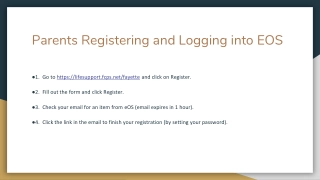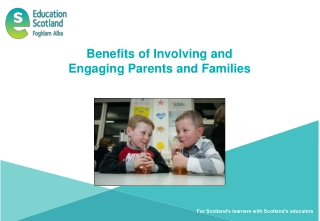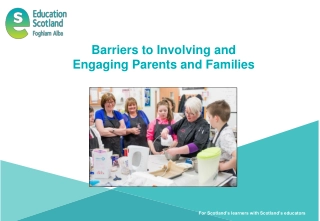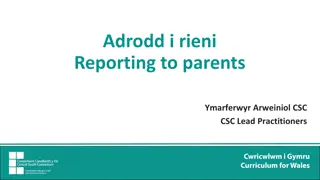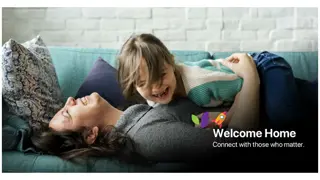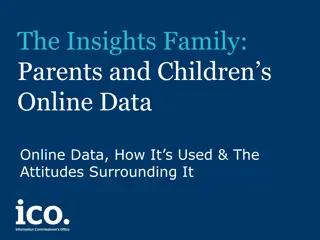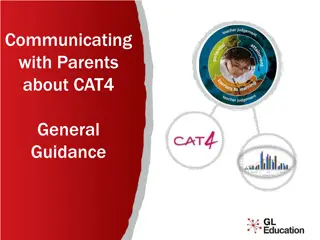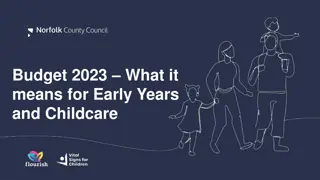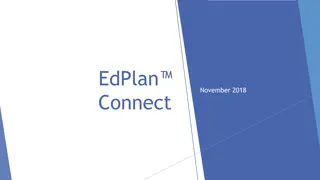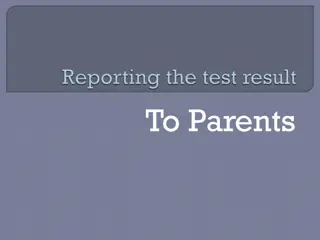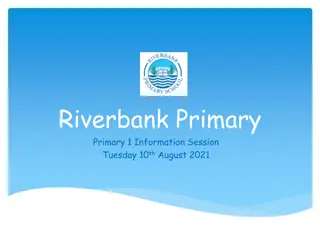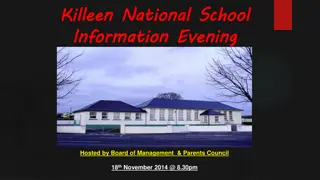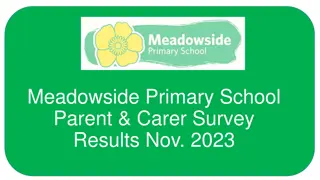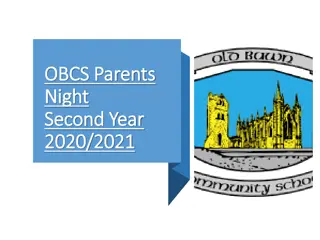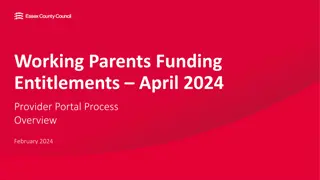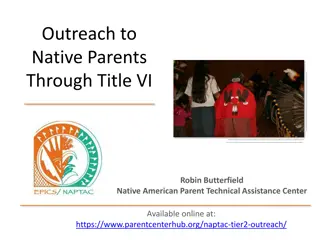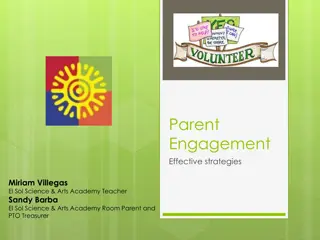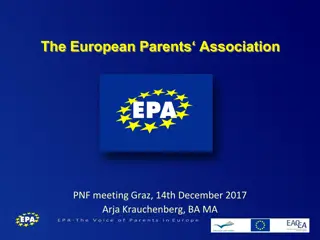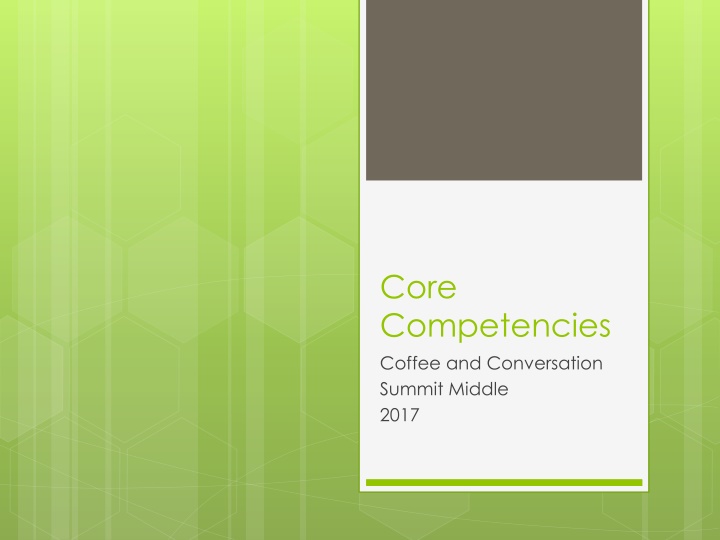
Unlocking Core Competencies: Communication, Creativity, Critical Thinking
Explore the infusion of Core Competencies into the curriculum at the Coffee and Conversation Summit 2017. Dive into the importance of intellectual, personal, and social proficiencies for deeper learning. Engage with topics like communication, creative thinking, critical thinking, and personal identity awareness to empower students across all grades.
Download Presentation

Please find below an Image/Link to download the presentation.
The content on the website is provided AS IS for your information and personal use only. It may not be sold, licensed, or shared on other websites without obtaining consent from the author. If you encounter any issues during the download, it is possible that the publisher has removed the file from their server.
You are allowed to download the files provided on this website for personal or commercial use, subject to the condition that they are used lawfully. All files are the property of their respective owners.
The content on the website is provided AS IS for your information and personal use only. It may not be sold, licensed, or shared on other websites without obtaining consent from the author.
E N D
Presentation Transcript
Core Competencies Coffee and Conversation Summit Middle 2017
Exciting New Aspect Our staff will be working at infusing the new Core Competencies into our curriculum, in every subject. This is not only happening at Summit, but across the province from Kindergarten to Grade 12.
What Are Core Competencies Core Competencies are sets of intellectual, personal, and social and emotional proficiencies that all students need to develop in order to engage in deeper learning.
3 Areas of Focus 1. Communication 2. Creative and Critical Thinking 3. Personal Awareness and Responsibility
What is Communication Communication is when students exchange information, experiences and ideas to help them learn more. Communication is how we express our thoughts, feelings ideas and opinions. We will be asking your children to reflect on and articulate: How do you share information with others? How do you demonstrate active listening and contribute to a collaborative work environments? What do you do when you disagree?
Creative Thinking Thinking in an original or new way and creating new ideas or concepts that matter to others. We will be asking your children to reflect on and articulate: Where do your new ideas come from? What inspires you to be creative? What are your passions? How are you pursuing these and learning more about these?
Critical Thinking Critical thinking is analyzing, drawing conclusions and making judgments about information We will be asking your children to reflect and articulate: What things do you consider when making a decision? Can you articulate others perspectives and your own assumptions? Describe something that didn t work and what you did differently? Can you take feedback and make changes with your learning Find other ways to extend the lessons/concepts of interest to you
Positive Personal and Cultural Identity Awareness of who you are including your family background, heritage, language and beliefs, contributing to a healthy sense of self. We will be asking your children to reflect and articulate: That their identity is made up of many interconnected aspects such as life experiences, family history, heritage and peer groups. What their values are and how they shape their choices Explain their own skills, attributes, strengths and areas for growth
Personal Awareness and Responsibility Developed skills to help stay healthy like setting goals, regulating emotions, respecting themselves and others and managing stress and persevere in difficult situations. We will be asking your children to reflect and articulate: Their needs as a learner, their motivation to learn How they advocate for themselves Strategies to manage their feelings and emotions Strategies to persevere with challenging tasks How they are taking ownership of their own goals How they try to have a balanced life-style
Social Responsibility Students ability to make a difference and contribute to family, community, society and the environment. Also, to be able to resolve problems peacefully and empathize with others creating healthy relationships. We will be asking your children to reflect and articulate: How they work to make positive changes How their actions impact their community How they compromise to meet the needs of others How they demonstrate respectful and inclusive behaviour
How does all this help your child By reflecting and starting to explain these different areas, your child is becoming more aware on their actions, their learning and their impact on their community. By becoming proficient in the Core Competencies, your child will become a more productive, caring, responsible member of society. Your child will start to understand their own learning styles and be able to go deeper with their understanding of the material presented to them. They will start to recognize their interests and strategies they can use to further study these areas.
Reflections Your child will be asked several times this year to think about how they are doing in each of these areas. What they are doing well and what their current stretches are. At the end of the year, your child will be sharing with you their growth over the year in each of these competencies. They will continue to learn and explore these until they graduate in grade 12.
Sample Reflections I am able to give at least one idea when in group discussions. I would like to ask more questions and be less shy. As a communicator who is still learning certain skills I've improved greatly. I've learned to give complete eye contact and a open body language. When I help others I've developed a softer speaking tone, larger hand gestures and an open mind when someone gives me feedback. I'll give my honest opinion, even to someone I'm not comfortable around. At the start of this year I had ended up saying some inappropriate words towards my peers. I had then stepped into that persons shoes and wondered how it would have felt if those words were towards me. Knowing this, I knew I needed to change as a person. I did not want to be viewed as a snobby and mean girl especially cause it gets you no where. So I am working on changing right now because everyone needs more friends than enemies.
How You Can Help Your Child At Home Try to talk with your child about their day, not just academics. Ask specific questions did you have any challenging problems in math today how did you solve it can you show me What did you read about today in your _______ novel study? Have you read something similar before? Can you help they connect it to a real world situation? Watch the news together and discuss larger problems happening in our community/ global community Discuss your family values and heritage

